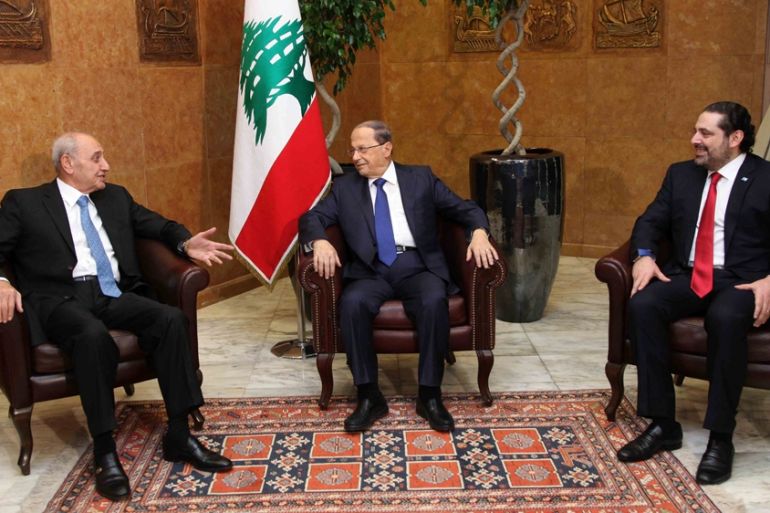Lebanon’s power players
Saad Hariri steps down as prime minister on November 4, potentially plunging the country into a fresh political crisis.

Lebanon‘s parliament, which is made up of 128 seats, is divided equally among Muslims and Christians. The most powerful of these political forces include Shia and Sunni Muslims, Maronite and Greek Orthodox Christians, and those affiliated with the Druze faith.
Lebanon’s 18 recognised religious sects are all represented in parliament. Under a political system forged in 1989 in line with the Taif Agreement, Lebanon’s president must be a Maronite Christian, the prime minister a Sunni Muslim, and the speaker of parliament a Shia.
Keep reading
list of 4 itemsMapping Israel-Lebanon cross-border attacks
Eid Mubarak: Hear greetings in different languages
When is Eid al-Fitr 2024 and how is it celebrated?
Future Movement
A Sunni-majority party headed by Saad Hariri, former prime minister and son of slain prime minister, Rafik Hariri. Saad Hariri stepped down on November 4, 2017 after almost a year as prime minister, citing Iranian interference. His resignation was announced while Hariri was in Saudi Arabia, which he is allied to.
Free Patriotic Movement
A Christian-majority party headed by former army General Michel Aoun, who returned to Lebanon in 2005, ending a life in exile in France, which he fled to after the end of the civil war in Lebanon. The FPM signed a memorandum of understanding with Hezbollah in February 2006, and the two parties have been close allies ever since.
Amal Movement
A Shia-majority party headed by Nabih Berri, serving 23 years as parliament speaker and counting. The party is an ally of Hezbollah and the Syrian government.
Hezbollah
A Shia party headed by Hassan Nasrallah. The party also has an armed wing that forced the withdrawal of the Israeli army from southern Lebanon, fought Israel in 2006, and is currently fighting alongside the Syrian government. Hezbollah is closely allied with Iran.
Progressive Socialist Party
A Druze party headed by Walid Jumblatt, who has shifted political allegiance several times over his career and used his position to act as kingmaker in political deals. Previously pro-Syrian, he is at present vocally pro-opposition, to the extent that he has voiced support for groups like al-Nusra Front. Currently the PSP is allied to the Future Movement.
